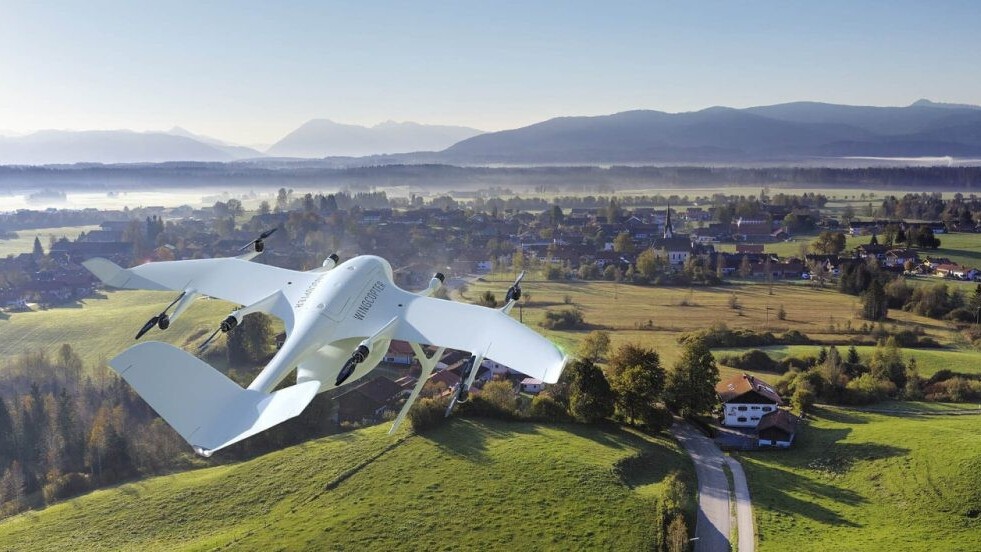
Story by
Linnea Ahlgren
German drone solution startup Wingcopter announced today it had landed €40 million in funding from the European Investment Bank (EIB) to scale up services and ramp up production of its latest model.
According to its developers, the Wingcopter 198 introduces a “new era for drone delivery.” Additions to the latest version of Wingcopter’s aircraft, “the world’s first triple-drop delivery drone,” include delivery of up to three packages to multiple locations during one flight.
What’s more, a single operator can fly up to 10 units simultaneously and beyond visual line of sight. The model also features an AI-based visual detect-and-avoid solution and smart precision landing capabilities.
The Wingcopter 198 has a wingspan of, you guessed it, 198 cm, and stretches 152 cm from front to tail. It can carry up to 6 kg and when carrying a 5 kg payload, it has a range of 75 km. Without any cargo, it can fly for up to 110 km.
The drone’s default cruise speed is 100 km/h, but it has a maximum speed of 144 km/h. Additionally, its developers say it can withstand strong winds due to a patented tilt-rotor technology – 15 m/s average, 20 m/s gusts.
Creating jobs at home and abroad
The €40 million investment is backed by the European Commission’s InvestEU programme under its sustainable infrastructure window, and the funds are provided as a quasi-equity investment, meaning that it ranks between equity and debt.
Of course, EIB, the lending arm of the European Union, does not splurge on projects simply because it features some cool tech. It also looks for broader social and environmental benefits when deciding whether or not to fund a project.
“Our goal is also to improve lives by creating many jobs — in R&D and manufacturing at our headquarters in Europe, as well as in the countries where we provide services, where we train and qualify local young people to operate our drone delivery networks,” said co-founder and CEO Tom Plümmer.

Furthermore, replacing carbon-intensive modes of light cargo transport with electric drones will reduce emissions and help further the bloc’s climate agenda.
“Backing European cleantech pioneers with global reach like Wingcopter is central to our mission,” said EIB Vice-President Ambroise Fayolle. “Electric cargo drones are an important vertical segment for a future of sustainable transport and logistics.”
Bringing it home
Wingcopter expects to operate its flagship model for the first time in Germany this summer. It will launch in a pilot project that will test the potential of on-demand transport of groceries and consumer goods.
The project, in turn funded by the German Federal Ministry for Digital and Transport and conducted together with the Frankfurt University of Applied Sciences, is intended to improve local supply in rural German communities through a sustainable delivery service
Wingcopter was founded in 2017, by Tom Plümmer, Jonathan Hesselbarth and Ansgar Kadura. To date, the advanced air mobility startup has raised over €100 million over nine funding rounds. Investors include European retailer REWE Group, ITOCHU, Xplorer Capital and Uber co-founder Garrett Camp’s investment arm Expa.
The Darmstadt-based developer is both a manufacturer of aviation-grade drone technology and a service provider for a wide range of drone operations. It has already deployed its unmanned aircraft, such as the Wingcopter 178, to deliver goods across small-scale commercial and humanitarian missions, as well as carry out geological surveys and infrastructure inspection in difficult to reach terrain.
One of the major advantages of drones in cargo operations in hard-to-reach and rural environments is that they require no additional infrastructure for take off and landing. Last summer, the company raised close to €40 million to deploy some of its drones in Sub-Saharan Africa.
Wingcopter has also participated in a joint project between UNICEF and the German Federal Ministry for Economic Cooperation and Development (BMZ) in Malawi, delivering life-saving medicines and medical supplies.
Get the TNW newsletter
Get the most important tech news in your inbox each week.
Also tagged with



